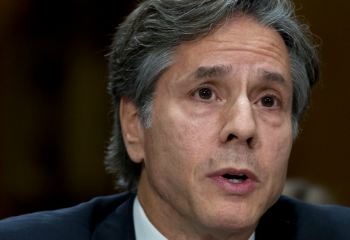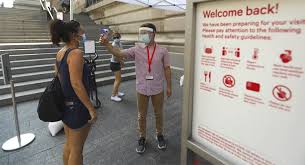World
Obama, Sharif to talk nukes, but no n-deal

Washington: Amid reports that the US is exploring a deal to limit Pakistan’s nuclear arsenal, White House acknowledged that President Barack Obama will discuss nuclear safety and security with Pakistan Prime Minister Nawaz Sharif.
But a civil nuclear deal like the one with India is unlikely “to come to fruition” when Sharif comes calling to meet Obama next week, his Press Secretary Josh Earnest told reporters here Thursday.
“I would not be overly excited about the prospects of reaching the kind of agreement that is being speculated about publicly,” he said when asked if the US is in fact serious about trying to work out a civilian nuclear deal with Pakistan.
“The expectation that we have is that a deal like the one that’s been discussed publicly is not something that’s likely to come to fruition next week,” Earnest said when pressed about whether Obama and Sharif would talk about it.
“But the United States and Pakistan are regularly engaged in a dialogue about the importance of nuclear security,” he said. “And I would anticipate that dialogue would include conversations between the leaders of our two countries.”
“At this point, the United States has been engaged with Pakistan, as well as the rest of the international community on issues related to nuclear safety and security,” Earnest said.
The spokesman said the US continued “to have confidence that the government of Pakistan is well aware of the range of potential threats to its nuclear arsenal.”
“We continue to be confident that Pakistan has a professional and dedicated security force that understands the importance and the high priority that the world places on nuclear security,” Earnest added.
Earlier, the New York Times reported Thursday that the Obama administration is exploring a deal to limit the scope of Pakistan’s nuclear arsenal, but Islamabad was not ready to curb a programme that it regards as its only real defence against India.
The talks being held ahead of Sharif arrival “focus on American concern that Pakistan might be on the verge of deploying a small tactical nuclear weapon . that would be far harder to secure than the country’s arsenal of larger weapons,” it said.
The discussions, the said, are being led by Peter R. Lavoy, a longtime intelligence expert on the Pakistani programme who is now on the staff of the National Security Council.
The central element of the proposal, according to officials and outside experts cited by the Times, would be a relaxation of the strict controls imposed on Pakistan by the Nuclear Suppliers Group.
The Times said Pakistani officials have demanded an India like nuclear deal that splits India’s nuclear infrastructure into a civilian programme that is under international inspection, and a military programme that is not.
“That does not appear to be on the table,” it said. “Instead, the United States is exploring ways to relax restrictions on nuclear-related technology to Pakistan, perhaps with a long-term goal of allowing the country to join the NSG.”
David Ignatius, a columnist for The Washington Post, first disclosed the exploratory talks in a column last week.
In a sharp reaction to the report, India then said Islamabad’s track record on proliferation should be taken into account in reaching a nuclear deal with Pakistan.
“All I would say is whosoever is examining that particular dossier should be well aware of Pakistan’s track record in the area of proliferation,” external affairs ministry spokesperson Vikas Swarup Swarup then said.
World
Lockdowns in China Force Urban Communities to Defy Censorship and Vent Frustration Online

Shanghai’s rich middle class is leading a wave of online dissent over the strict and prolonged lockdowns imposed in various parts of the country. Chinese internet censorship is struggling as patience is wearing thin in many urban centers, coming up with creative forms of online protests.
Social Media Posts Revealing Lockdown Tension in Shanghai
Drawn-out lockdowns are nothing new in China as authorities insist with the nation’s zero-Covid policy since the start of the pandemic. Currently over This time around, however, metropolitan areas like Shanghai are increasingly difficult to keep quiet, given that its more than 25 million residents have seen weeks of total isolation along with food shortages and many other service interruptions.
Dozens of towns and reportedly over 300 million Chinese citizens have been affected by lockdowns of different severity. As expected, urban netizens have been most outspoken over their difficulties by finding creative ways to get around state censorship and bans placed on topics, news comments and spontaneous campaigns.
Shanghai residents have been using mobile proxies and hijacking seemingly unrelated hashtags to talk about healthcare issues, delivery failures and the overall severity of their situation. The “positive energy” that the Chinese government wants to transmit during the recent prolonged series of lockdowns does not come naturally to those counting food supplies and online censors are working hard to filter words, trending topics and undesired social media sharing.
WeChat groups and message threads are under constant monitoring. Posts questioning the zero-Covid approach have been quickly deleted, including by leading Chinese health experts like Dr. Zhong Nanshan. Video footage is soon censored and protests and investigations are quickly made to disappear.
Where this has not worked, officials have exposed banners with warnings and outright threats like “watch your own mouth or face punishment”, while drones have been patrolling the city skies. Yet, if anything, this has led to further tensions and unspoken confrontation with Shanghai’s educated and affluent middle class.
Creative Online Solutions Harnessing Civic Energy
Announcements by Chinese social media that they would be publishing the IP addresses of users who “spread rumors” have not helped either. Tech industry research has shown that much of Asia’s tech-savvy population has a habit of using mobile proxies and other privacy tools, quickly finding workarounds to browse the internet freely and talk to the world about the hottest topics.
The sheer volume of forbidden posts is already a challenge for the very censorship system, experts explain. Unable to track all trending hashtags, state workers overlook topics that speak about the US, Ukraine or other popular news. Linking human rights elsewhere to their situation, Chinese online dissidents establish their informal channels and “hijack” the conversation to share personal or publicly relevant information about the Covid suppression in their town.
Sarcastic and satirical posts still dominate. Others hope to evade the censors by replacing words from famous poems or the national anthem. One thing is certain – social media, when harnessed with the right creativity, has proven its ability to mount pressure on the government in even some of the most strictly controlled tech environments like China.























